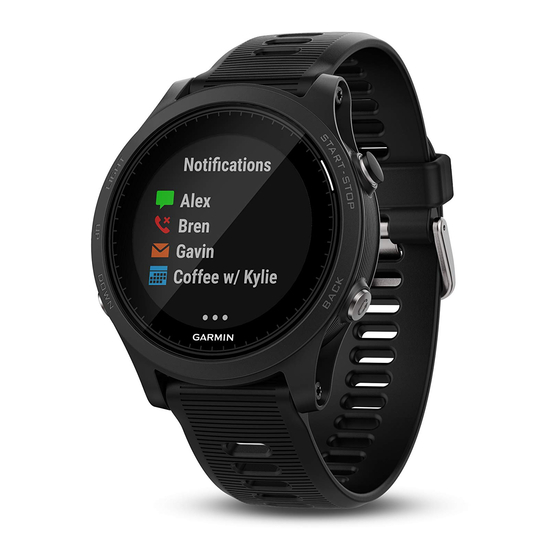Garmin FORERUNNER 935 Gebruikershandleiding - Pagina 30
Blader online of download pdf Gebruikershandleiding voor {categorie_naam} Garmin FORERUNNER 935. Garmin FORERUNNER 935 42 pagina's.
Ook voor Garmin FORERUNNER 935: Gebruikershandleiding (46 pagina's)

ANT+ Sensors
The device is compatible with these optional, wireless ANT+
accessories.
• Heart rate monitor, such as HRM-Run
Rate Monitor, page
5)
• Bike speed and cadence sensor
Speed or Cadence Sensor, page
• Foot pod
(Foot Pod, page
• Power sensor, such as Vector
• tempe
wireless temperature sensor
™
For information about compatibility and purchasing additional
sensors, go to http://buy.garmin.com.
Pairing ANT+ Sensors
The first time you connect a sensor to your device using ANT+
wireless technology, you must pair the device and sensor. After
they are paired, the device connects to the sensor automatically
when you start an activity and the sensor is active and within
range.
NOTE: If a heart rate monitor was bundled with your device, the
included heart rate monitor is already paired with your device.
1
If you are pairing a heart rate monitor, put on the heart rate
monitor
(Putting On the Heart Rate Monitor, page
The heart rate monitor does not send or receive data until
you put it on.
2
Bring the device within 3 m (10 ft.) of the sensor.
NOTE: Stay 10 m (33 ft.) away from other ANT+ sensors
while pairing.
3
Hold MENU.
4
Select Settings > Sensors & Accessories > Add New.
5
Select an option:
• Select Search All.
• Select your sensor type.
After the sensor is paired with your device, the sensor status
changes from Searching to Connected. Sensor data appears
in the data page loop or a custom data field.
Using an Optional Bike Speed or Cadence
Sensor
You can use a compatible bike speed or cadence sensor to
send data to your device.
• Pair the sensor with your device
page
24).
• Update your fitness user profile information
User Profile, page
10).
• Set your wheel size
(Wheel Size and Circumference,
page
31).
• Go for a ride
(Starting an Activity, page
Training with Power Meters
• Go to
www.garmin.com/intosports
that are compatible with your device (such as Vector).
• For more information, see the owner's manual for your power
meter.
• Adjust your power zones to match your goals and abilities
(Setting Your Power Zones, page
• Use range alerts to be notified when you reach a specified
power zone
(Setting an Alert, page
• Customize the power data fields
Screens, page
19).
24
(Putting On the Heart
™
(Using an Optional Bike
24)
24)
™
(tempe, page
25)
5).
(Pairing ANT+ Sensors,
(Setting Up Your
2).
for a list of ANT+ sensors
11).
20).
(Customizing the Data
Using Electronic Shifters
Before you can use compatible electronic shifters, such as
Shimano
Di2
shifters, you must pair them with your device
®
™
(Pairing ANT+ Sensors, page
optional data fields
(Customizing the Data Screens, page
The fēnix 5/5S device displays current adjustment values when
the sensor is in adjustment mode.
Situational Awareness
Your fēnix device can be used with the Varia Vision
Varia
™
smart bike lights, and rearview radar to improve
situational awareness. See the owner's manual for your Varia
device for more information.
NOTE: You may need to update the fēnix software before
pairing Varia devices
(Updating the Software Using Garmin
Connect Mobile, page
17).
Foot Pod
Your device is compatible with the foot pod. You can use the
foot pod to record pace and distance instead of using GPS when
you are training indoors or when your GPS signal is weak. The
foot pod is on standby and ready to send data (like the heart
rate monitor).
After 30 minutes of inactivity, the foot pod powers off to
conserve the battery. When the battery is low, a message
appears on your device. Approximately five hours of battery life
remain.
Improving Foot Pod Calibration
Before you can calibrate your device, you must acquire GPS
signals and pair your device with the foot pod
Sensors, page
24).
The foot pod is self-calibrating, but you can improve the
accuracy of the speed and distance data with a few outdoor runs
using GPS.
1
Stand outside for 5 minutes with a clear view of the sky.
2
Start a running activity.
3
Run on a track without stopping for 10 minutes.
4
Stop your activity, and save it.
Based on the recorded data, the foot pod calibration value
changes, if necessary. You should not need to calibrate the
foot pod again unless your running style changes.
Calibrating Your Foot Pod Manually
Before you can calibrate your device, you must pair your device
with the foot pod sensor
(Pairing ANT+ Sensors, page
Manual calibration is recommended if you know your calibration
factor. If you have calibrated a foot pod with another Garmin
product, you may know your calibration factor.
1
Hold MENU.
2
Select Settings > Sensors & Accessories.
3
Select your foot pod.
4
Select Cal. Factor > Set Value.
5
Adjust the calibration factor:
• Increase the calibration factor if your distance is too low.
• Decrease the calibration factor if your distance is too high.
Setting Foot Pod Speed and Distance
Before you can customize the foot pod speed and distance, you
must pair your device with the foot pod sensor
Sensors, page
24).
You can set your device to calculate pace and distance from
your foot pod data instead of GPS data.
1
Hold MENU.
2
Select Settings > Sensors & Accessories.
24). You can customize the
™
device,
(Pairing ANT+
24).
(Pairing ANT+
ANT+ Sensors
19).
